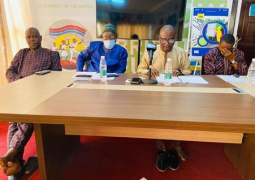
They learn through oral instruction and observation, and often taking the lead in celebrating festivals and events, with a strong emphasis on respecting elders and upholding values like hospitality and family unity.
This includes learning traditional dances, music, storytelling, and rituals, often passed down through generations within their ethnic groups.
Much of Gambian culture is passed down through oral storytelling, with young people learning historical narratives, family genealogies and social customs from elders.
Traditional initiative ceremonies for both boys and girls mark the transition into adulthood, teaching them about their roles in the community and cultural responsibilities.
Young Gambians are often involved in traditional music and dance performance, particularly during festivals and celebrations, playing instrument like the ‘kora’ and participating in vibrant group dances.
A core aspect of Gambian culture is deep respect for elders with young people expected to show deference and courtesy to their seniors.
Youth actively contribute to community life participating in communal activities like farming, helping with household chores, and assisting in preparing for culture events.
Young people play a significant role in organising and participating in various cultural festivals such as Banjul cultural festival, Sanyang international festival and ‘Kankurang’ festival.
Gambian youth are also exposed to modern influences, often incorporating contemporary elements into their cultural expressions.
Meanwhile, Gambian youth traditionally play a significant role in development by actively participating in community activities, contributing to agriculture.
A large portion of young people contribute to family activities, which is a primary driver in The Gambia, learning techniques from elders and participate in planting, harvesting and livestock care.
Traditional learning often happens through where young people gain skills in trades such as carpentry, tailoring, fishing and blacksmithing by working alongside experienced masters.
Youth actively participate in communal projects such as building maintenance, cleaning and community events.
Knowledge transfer is often done through storytelling, proverbs and oral techniques, allowing young people to learn about history, culture and social norms.
Young Gambians play a vital role in maintaining traditional arts, music, dance and ceremonies, ensuring their continuity through generations.
Lack of formal education can hinder opportunities for youth to contribute effectively to development.
High youth unemployment can limit participation in traditional economic activities.
Movement of young people to urban areas can lead to shortage of labour in rural communities.
There are programmes focused on providing vocational training and entrepreneurship support to young Gambians, aiming at enhancing their employability in sectors such as tourism and agriculture.
Government policies are aimed at promoting youth participation in decision-making and addressing challenges faced by young people.





